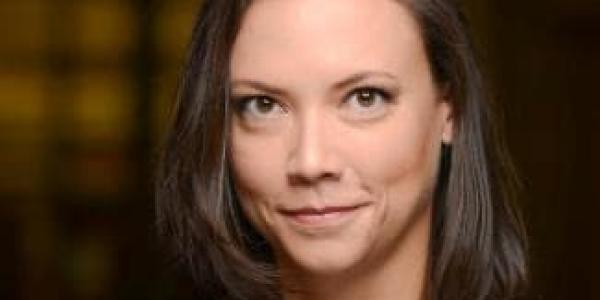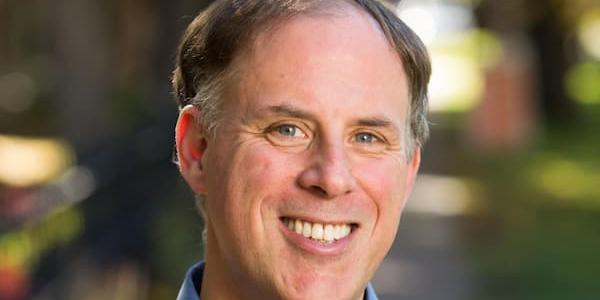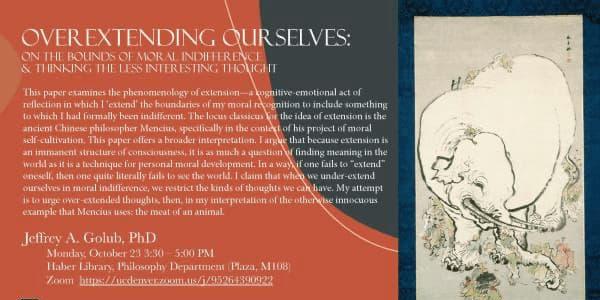Philosophy Asks the Ultimate Questions
Interested? Request more information
Credit hours: 120
Full-time, part-time
On-campus with some online courses available
Start terms: fall, spring, summer
Philosophy calls on both your creativity and your rigor. As a student of philosophy, you will become skilled at:
Evaluating Arguments—Learn to distinguish between good and bad arguments, irrespective of their subject matter, to be able to make informed decisions and recommendations on contentious issues.
Clarity of Thought and Reasoning—Separate distinct issues, consider them independently and evaluate the consequences of positions on them.
Advanced Communication—Frame, express, and convey ideas to precisely articulate your position using both oral and written communication.
Breadth and Diversity of Vision—Appreciate new and confronting ideas and value different perspectives on life, society, and knowledge.
These skills help you make decisions, weigh evidence, assess opinions, contemplate mysteries, understand the world, and live a thoughtful life. Philosophy allows you to explore possibilities by broadening your world perspective and developing a critical lens.
This is an excellent foundation for almost any professional field. Philosophical inquiries cover a wide range of subject matter including:
- ethics and politics
- art and literature
- history and religion
- technology
- the sciences
A degree in philosophy is excellent preparation for law and medicine, software development,and a spectrum of positions in business, public service and more.
Philosophical thought is limited only by the bounds of imagination and human inquiry. What makes philosophy so vital is that philosophy does not simply aim to master a given set of facts but teaches you how to think, how to speak, and how to write clearly when questioning those facts. The benefits of a philosophy degree last a lifetime, setting you on a path toward self-development, intellectual sophistication, and the enrichment that comes from living a more reflective life.
Progam features
Honi F. Haber Memorial Library
Students have access to the Honi F. Haber Memorial Library, an extensive philosophy library located in the department, dedicated to our beloved former faculty member, Honi Haber, PhD.
Engaged Faculty
You will find CU Denver’s Philosophy Department full of engaged scholars who enjoy connecting with you and exploring new perspectives and ideas.
The department is pluralistic, with faculty strengths that include ancient, continental, analytic, feminist, and American approaches.
The faculty agree that a proper understanding of historical context is basic to more specialized work in philosophy, and that a diversity of approaches to philosophical subjects is the beginning of wisdom. And every member teaches regularly at the introductory level which makes your learning experience fulfilling.
Choose Your Journey
With the Philosophy major, you choose your own journey through our diverse curriculum. We offer five model journeys designed to help get you thinking:
The Ethics and Values journey is for you if you are interested in studying the nature of morality, how people relate to one another, and what is involved in having a good life.
Explore the journey of many Philosophical Traditions, reflecting the multiplicity of cultures around the world, and consider how these translate in the 21st century.
Make connections and solve specific philosophical problems using the Mind and Consciousness journey to understand the relationships between our individual minds and the world.
Apply philosophy to the larger social, scientific, and technological structures that inform our everyday lives in the Science, Technology, and Knowledge journey.
Are you interested in creating a more equitable and just world? Use the Social Justice, Politics, and Diversity journey to examine the political institutions and social practices that structure our collective life.
These journeys are described below in the curriculum section.
Careers
Philosophy offers many career options
Research different degrees and career trajectories at DataUSA.io
(Screenshot—July 2024)
Philosophy is an excellent foundation for most professional fields. Philosophical inquiries can cover a wide range of subject matter including ethics and politics, art and literature, history and religion, technology, and the sciences.
A degree in philosophy is excellent preparation for:
- Law
- Medicine
- Software development
- Journalism and Media
- Government and Public Administration
- Education and Research
Curriculum
The BA in Philosophy allows you maximum flexibility to be able to choose your own journey through our diverse curriculum.
Majoring in Philosophy: 36 hours
All philosophy majors will engage with introductory philosophy courses in:
- truth and reality
- ethics and logic
- language and scientific reasoning
Journeys
Once you have completed your core Philosophy courses, explore one of our five model journeys to custom tailor your educational career.
Ethics and Values
Perhaps one of the most distinctive characteristics of human beings is that our existence is completely entangled with ethical norms and values that fundamentally change our minds and the direction of our lives. This journey will explore the nature of morality, how people should relate to others, and what is involved in having a good life.
Philosophical Traditions
There are multiple philosophical traditions—reflecting the multiplicity of cultures around the world—and some of these philosophical traditions have lasted for millennia. But how do these traditions of thought bear on us today in the 21st century? Are they not traditions to be interrogated, challenged, and taken in the new directions? This journey offers you the opportunity to develop critically by engaging the great thinkers of the past for the sake of opening up new pathways of thinking in the future.
Mind and Consciousness
The study of what our minds are and how they work is fundamental to our understanding of both ourselves and our world. This journey seeks to help you explore the many relationships between our individual minds and the world.
Science, Technology, and Knowledge
Science and technology inform every aspect of our lives, changing both how we act and what we know. Too often, we do not critically assess these large social structures. This journey teaches you (a) the nature of knowledge, (b) our tools for thinking (physical, mental, and symbolic), and (c) the larger social, scientific, and technological structures built upon these fundamentals.
Social Justice, Politics, and Diversity
Are you interested in creating a more equitable and just world? The courses included in this journey examine the political institutions and social practice that structure our collective life, questions regarding our social and ethical responsibilities for justice and equality, as well as systems of power and domination at the intersection of gender, race/ethnicity, class, sexuality, and disability. In this journey, you will develop analytical skills, critical thinking, cultural sensitivity, and political awareness.
Whatever educational journey you choose, the BA in Philosophy will guide you in cultivating the necessary skills for articulate oral and written communication, clear thinking and reasoning, and drawing connections among ideas of all kinds.
CU Denver Core: 34-40 Hours
You’ll be educated in
- English and mathematics
- international and cultural diversity perspectives
- arts and humanities
- behavioral, physical, and social sciences
College of Liberal Arts and Science Core—15 Hours
These courses give you a better understanding of the issues and skills you need to succeed.
Topics include:
- Logic, Language, and Scientific Reasoning
- Psychology
- Writing for the Sciences
- Public Health
Minors in Philosophy
Philosophy majors or Non-DEGREE majors can add a minor to your degree by completing at least 15 hours of specified coursework. You will need to see your CLAS advisor to declare a minor.
Philosophy minor
Topics include:
- Introductory philosophy
- Ancient Greek Philosophy
- Modern Philosophy
Philosophy of Science minor
Topics include:
- Language, Logic, & Scientific Reasoning
- Investigating Nature
- Philosophy of Science
Ethics Minor
Topics include:
- Ethics and Society
- Business Ethics
- Environmental Ethics
- Bioethics
Add a Masters in Humanities to your Bachelor degree in as little as one extra year (4+1)
Save time and tuition while expanding your career opportunities at the same time by enrolling in the Philosophy (BA) + Master’s in Humanities (MH degree, Philosophy and Theory Track) program.
Benefits include
More career opportunities: Some career paths require that job candidates hold advanced degrees. Completing the BA + MH program allows you to apply for higher level positions more quickly, providing an advantage in a competitive job market.
Saves time: Combining the Bachelors and Masters programs allow you to complete your undergraduate and graduate studies quickly, typically within five years instead of six or more.
Cost: A shorter timeline to complete a Master’s Degree in Humanities means less tuition, fees, and related educational expenses.
Teaching assistantships: The Department of Philosophy may offer you, as a qualified MA student, research, or teaching assistantships. Combining the BA and MH degrees may allow you to access these opportunities.
Faculty: Combining the BA and MH degrees allows you to continue to take courses at the graduate level from the same familiar, award-winning, and caring faculty members.
Learning outcomes
- Recognize and comprehend the salient elements of philosophy's significant historical figures, periods, and areas.
- Understand how philosophical frameworks and theories expand the meanings and implications of existing cultural areas (e.g. those found in science technology, the arts, politics, medicine, social justice.)
More specifically, the above includes training (most typically in writing) about how to:
- Interpret texts by careful reading and synthesis of meanings.
- Identify and criticize philosophical arguments.
- Develop original arguments supported by texts and logical reasoning.
- Outline major philosophical frameworks.
Tuition
The cost of tuition for the Bachelor of Arts (Ba) in Philosophy is different for in-state and out-of-state students. See the link for the current table of rates.
Residents of Western Interstate Commission for Higher Education (WICHE) states may qualify for reduced tuition rates. The Western Undergraduate Exchange (WUE) program requires students to maintain current residency in WICHE state until degree completion.
Scholarships
Each year, CU Denver undergraduate students are awarded over $30 million in scholarships from institutional, local, state, and national sources. Learn more, and apply here.
Other opportunities
The department of Integrative Biology and other departments have paid positions (both in the work-study program and outside of it) which may include jobs as graders, teaching assistants, and learning assistants. Please expect to have to apply. Learn more here.
Admission Requirements
If you are an incoming freshman to CU Denver (in-state, out-of-state, and international applicants), you can apply through either the Common Application or the Milo Application. Transfer students will need to submit the Milo Application.
Incoming first-year students
CU Denver requires that students complete the Colorado Higher Education Admission Requirements (HEAR). You will not have to meet all Minimum Academic Preparation Standards (MAPS) for admission, but you will need to complete CU Denver coursework by graduation.
Transfer Students
We have strong connections with other four-year and community colleges. If you have completed more than 24 credits of transferable coursework, you will be evaluated for admission on the basis of your college GPA without regard to your high school performance. If you have fewer than 24 credits, you will be evaluated based on both your high school and college GPAs. For more information and to plan your transfer, see transfer admissions in the admissions office.
If you are in your first or second semester at one of the participating Colorado community colleges and plan to transfer to CU Denver after earning your associate degree, CU Denver Bridge to Bachelors might be a great program for you. To qualify, you must meet the criteria including meeting regularly with your assigned CU transfer advisor while you are attending community college.
International Students
You will need to begin your application through the Office of International Affairs. They will help you manage your application process.
Application deadlines
Spring
Domestic Application: January 1
International Applications: Priority is September 15, and Final is October 15
Summer
Domestic Applications: May 15
International Applications: Priority is January 15, and Final is March 15
Fall
Domestic Applications: August 1
International Applications: Priority is March 15, and Final is May 15

Inclusion is our value
CU Denver is home to one of the most diverse student populations in Colorado.
- Join your choice of 100+ student groups and organizations which support your identity and interests
- Your department and faculty are committed to the pursuit of equity and inclusion in the classroom, lab, and beyond
- Learn more at our Office of Diversity, Equity, and Inclusion

Find your people
Campus can feel like a huge place. We help you find your people by offering the experience of a more traditional, small liberal arts program—for a fraction of the cost. We offer a variety of clubs and networking opportunities.

Alumni Profile: Lauren Davison
After receiving her BA in Philosophy from CU Denver, Lauren Davison received her JD from the University of Denver Law School. After law school, she completed two judicial clerkships, first at the Colorado Court of Appeals and second at the Colorado Supreme Court. She is currently an Assistant Attorney General at the Colorado Attorney General’s Office.





